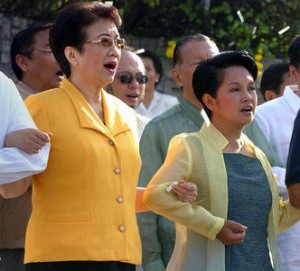Legitimacy of Aquino/Arroyo Presidency
For Carmelo, Amy and Carlito.
Estrada v. Desierto (G.R. No. 146710-15; March 2, 2001)
At issue in these cases is the legitimacy of the presidency of respondent Gloria Macapagal-Arroyo. In G.R. No. 146738, the petition for quo warranto seeks a declaration that petitioner Joseph Ejercito Estrada is the lawful President of the Philippines and that respondent Gloria Macapagal-Arroyo is merely acting President on account o the former's temporary disability. On the other hand, in G.R. Nos. 146710-15, the petition seeks to prohibit respondent Ombudsman Aniano Desierto from investigating charges of plunder, bribery, malversation of public funds, and graft and corruption against petitioner Estrada on the theory that, being still President, he is immune from suit. (Justice Mendoza)
At issue in these cases is the legitimacy of the presidency of respondent Gloria Macapagal-Arroyo. In G.R. No. 146738, the petition for quo warranto seeks a declaration that petitioner Joseph Ejercito Estrada is the lawful President of the Philippines and that respondent Gloria Macapagal-Arroyo is merely acting President on account o the former's temporary disability. On the other hand, in G.R. Nos. 146710-15, the petition seeks to prohibit respondent Ombudsman Aniano Desierto from investigating charges of plunder, bribery, malversation of public funds, and graft and corruption against petitioner Estrada on the theory that, being still President, he is immune from suit. (Justice Mendoza)
Lawyers League v. Aquino (G.R. No. 73748; May 22, 1986)
On February 25, 1986, President Corazon Aquino issued Proclamation No. 1 announcing that she and Vice President Laurel were taking over the power and authority left by then-President Ferdinand Marcos, after the latter was ousted by the people through a People Power Revolution.
On March 25, 1986, Proclamation No.3 was issued providing the basis of the Aquino government's assumption of power by stating that the "new government was installed through a direct exercise of the power of the Filipino people assisted by units of the New Armed Forces of the Philippines."
At issue is the legitimacy of the Aquino administration. The Supreme Court held that Aquino's legitimacy as president is not a justiciable matter but political issue. Hence, it is the people who are to judge either by themselves directly or through their representatives. The Court further held that the people have accepted the Aquino government which is in effective control of the entire country. It is not merely a de facto government but, in fact and at law, a de jure government. The community of nations has likewise recognized the legitimacy of the new government.
The difference between the case of Estrada v. Desierto (G.R. No. 146710-15; March 2, 2001) and the case of Lawyers League v. Aquino (G.R. No. 73748; May 22, 1986)
Respondents rely on the case of Lawyers League for a Better Philippines and/or Oliver A. Lozano v. President Corazon C. Aquino, et al. and related cases to support their thesis that since the cases at bar involve the legitimacy of the government of respondent Arroyo, ergo, they present a political question. A more cerebral reading of the cited cases will show that they are inapplicable. In the cited cases, we held that the government of former President Aquino was the result of a successful revolution by the sovereign people, albeit a peaceful one. No less than the Freedom Constitution declared that the Aquino government was installed through a direct exercise of the power of the Filipino people "in defiance of the provisions of the 1973 Constitution, as amended." In is familiar learning that the legitimacy of a government sired by a successful revolution by people power is beyond judicial scrutiny for that government automatically orbits out of the constitutional loop. In checkered contrast, the government of respondent Arroyo is not revolutionary in character. The oath that she took at the EDSA Shrine is the oath under the 1987 Constitution. In her oath, she categorically swore to preserve and defend the 1987 Constitution. Indeed, she has stressed that she is discharging the powers of the presidency under the authority of the 1987 Constitution. (Justice Puno)
In fine, the legal distinction between EDSA People Power I and EDSA People Power II is clear. EDSA I involves the exercise of the people power of revolution which overthrew the whole government. EDSA II is an exercise of people power of freedom of speech and freedom of assembly to petition the government for redress of grievances which only affected the office of the President. EDSA I is extra-constitutional and the legitimacy of the new government that resulted from it cannot be the subject of judicial review, but EDSA II is intra-constitutional and the resignation of the sitting President that it caused and the succession of the Vice President as President are subject to judicial review. EDSA I presented a political question; EDSA II involves legal questions. A brief discourse on freedom of speech and of the freedom of assembly to petition the government for redress of grievance which are the cutting edge of EDSA People Power II is not inappropriate. (Justice Puno)





